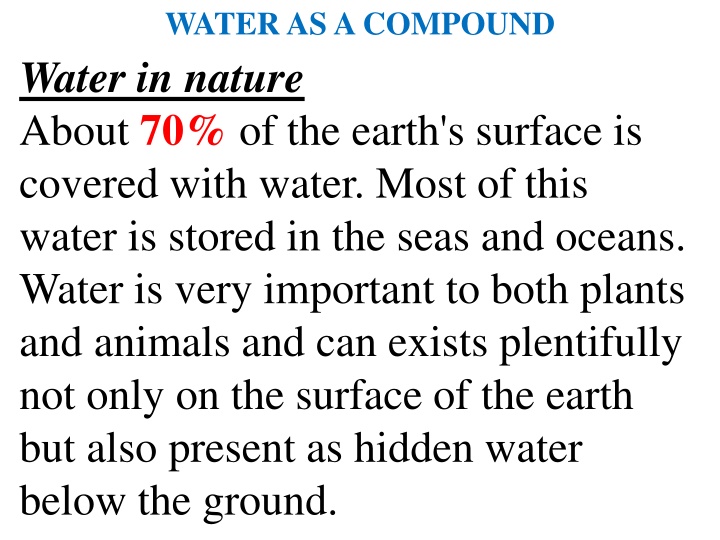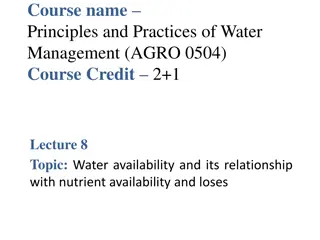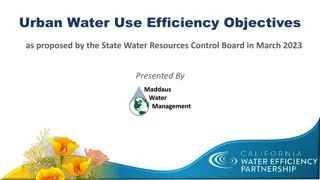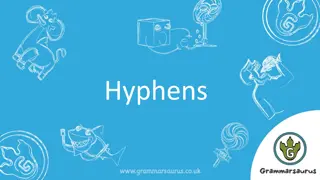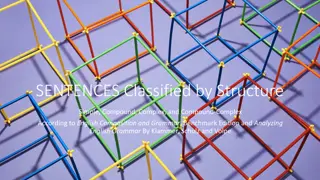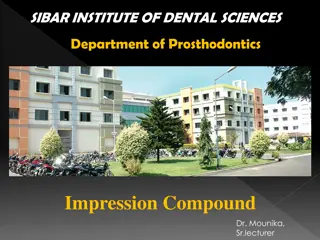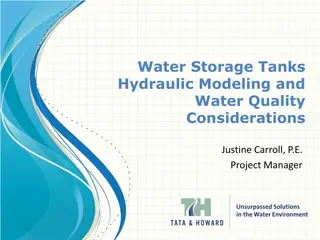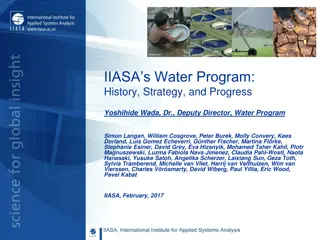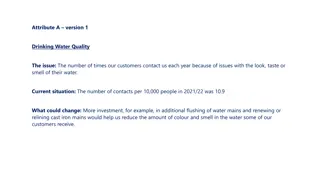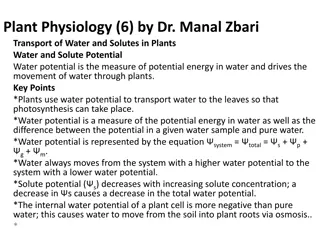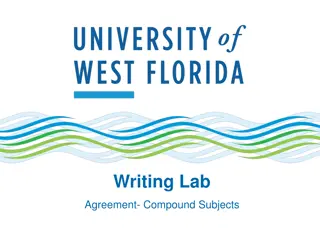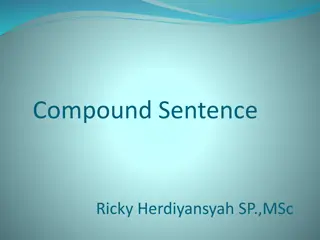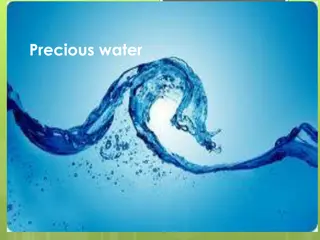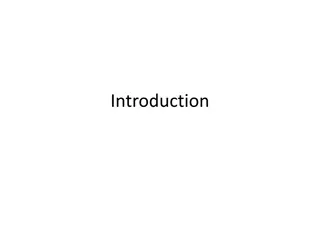Water as a Compound: Essential Properties and Properties
Water, a vital element covering 70% of the Earth, is composed of hydrogen and oxygen. It has various physical and chemical properties, acts as a universal solvent, and plays crucial roles in nature. From boiling and freezing points to chemical reactions, water's significance is undeniable. Its sources include surface water and underground water, with dissolved solids affecting its properties. Explore the world of water through its composition and characteristics.
Download Presentation

Please find below an Image/Link to download the presentation.
The content on the website is provided AS IS for your information and personal use only. It may not be sold, licensed, or shared on other websites without obtaining consent from the author.If you encounter any issues during the download, it is possible that the publisher has removed the file from their server.
You are allowed to download the files provided on this website for personal or commercial use, subject to the condition that they are used lawfully. All files are the property of their respective owners.
The content on the website is provided AS IS for your information and personal use only. It may not be sold, licensed, or shared on other websites without obtaining consent from the author.
E N D
Presentation Transcript
WATER AS A COMPOUND Water in nature About 70% of the earth's surface is covered with water. Most of this water is stored in the seas and oceans. Water is very important to both plants and animals and can exists plentifully not only on the surface of the earth but also present as hidden water below the ground.
WATER AS A COMPOUND Composition of water Basically water is made up of two chemical elements: hydrogen and oxygen with the chemical formula H2O
WATER AS A COMPOUND Physical properties ofwater (in pure water state): 1. Water is clear, colourless and odourless liquid. 2. Water boils at 100 C and freezes at 0 C under standard atmospheric pressure of 760mmHg. 3. Water boils into steam at standard atmospheric pressure. 4. Water has a maximum density of 1 gcm3at 4 C (277.15K). 5. Water can dissolve most substances.(universal solvent) 6. Water exists in three states. Namely: solid (ice), liquid (water) and gas (water vapour) at a room temperature. 7. It is a poor conductor of electricity 8. It is a poor conductor of heat 9. Water wets glass 10.Water has irregular expansion.
WATER AS A COMPOUND Chemical properties of water 1. Water reacts with some metals to produce oxygen. 2. Water is neither acidic nor base. It is neutral and has a pH of 7. 3. Water is made up of elements; hydrogen and oxygen in the ratio 2:1 .That is H20. 4. Oxides of non-metals dissolve in water to form acidic solutions. 5. Water is an excellent solvent and most substances dissolve in it to some extend forming aqueous solutions(solution whose solvent is water)
WATER AS A COMPOUND Effects of dissolved solids on pure water. 1. Dissolved solids such as salt and sugar raise the boiling point of water. 2. Dissolved solids lower the freezing point of water. 3. Atmospheric pressure also alters the boiling and freezing points of water.
WATER AS A COMPOUND Sources of water Surface water Underground water. Surface water Surface water is a water that can be found on the surface of the earth. Examples of surface water are: rain water, sea water, lake water, rivers, stream water, pond water and lagoon water.
WATER AS A COMPOUND Rain water Among all the sources of water, rain water is the purest form of all natural waters. Normally, when rain water is coming down to the surface of the earth through the air, the first showers collect dust particles, germs and bacteria which are present in the atmosphere. As it continuous to rain, the subsequent showers are free from these impurities. Rain water however contains dissolved air (gases) particularly carbon dioxide and sulphur dioxide.
WATER AS A COMPOUND Sea water Sea water contains mineral salts, organic remains from sewage, dead organisms etc. Sea water is considered to be the most impure form of natural water. It contains a large percentage of dissolved concentrated sodium chloride. As a result of the presence of sodium chloride, sea water is called saline water (brine) and is salty to taste.
WATER AS A COMPOUND Rivers and streams: The main sources of rivers and streams is the rain, melting of snow and on mountains. As rain falls, it flows on the ground and directly enters into the river and streams. On it way, it dissolves soluble salts such as magnesium , sodium chloride, sulphate and ammonium salts. Rivers and streams contain a lot of impurities such as branches of trees, dead animals, dead plants, broken plastics and glasses.
WATER AS A COMPOUND Underground water Underground water is a water that can be found beneath the surface of the earth. Underground water can be grouped into two. Well water Spring water.
WATER AS A COMPOUND Well water: Well is a deep round hole dug until it reaches the hard rocks of the earth where water reservoir is found. This water reservoir found above the hard rocks is called well water. The depth of a well varies from place to place.Normally, sandy areas such as the sea side, has shallow wells. Water from deep wells is purer than those from a shallow well. Well water contains soluble or dissolved salts.
WATER AS A COMPOUND Spring water: Spring water is found when underground water rushes out and flows from the ground. Spring water is also filtered naturally and therefore free from suspended impurities.
WATER AS A COMPOUND Impurities in natural water The impurities in water include the following ? soil particles ? living and dead organisms ? dissolved chemicals or gases ? germs
WATER AS A COMPOUND Impurities in natural water The impurities in water include the following ? soil particles ? living and dead organisms ? dissolved chemicals or gases ? germs
WATER AS A COMPOUND Nature of Contamination Water from certain sources contains impurities and germs that are harmful to human health. The impurities make water from certain sources unsuitable for human use. Rain water collected directly from the sky is the purest source and form of natural water. The sea water contains a lot of impurities such as micro-organisms, chemicals or dissolved industrial waste and therefore considered to be the most contaminated natural source of water. Underground water is less contaminated than streams and rivers.
WATER AS A COMPOUND The order of increasing contamination is as follows Rain well (bore hole) spring river or stream lake sea.
WATER AS A COMPOUND How does water comes into contact with chemicals or impurities 1. ?Human activities such as mining, sand winning that takes place along the bank of rivers and other waterbodies. 2. ?Disposal of industrial waste and sewage from schools, homes and factories into waterbodies. 3. ?Refineries and spillage of oil from tankers may be washed into water bodies. 4. ?Poor agricultural practices will lead to the rain washing fertilizers into rivers and other water bodies.
WATER AS A COMPOUND How does water comes into contact with chemicals or impurities 1. ?Human activities such as mining, sand winning that takes place along the bank of rivers and other water bodies. 2. ?Disposal of industrial waste and sewage from schools, homes and factories into water bodies. 3. ?Refineries and spillage of oil from tankers may be washed into water bodies. 4. ?Poor agricultural practices will lead to the rain washing fertilizers into rivers and other water bodies.
WATER AS A COMPOUND Experiment to show that water from certain sources (pond, river) contains impurities. Materials/Apparatus: Water from a pond or river, beaker, funnel, filter paper, hand lens, retort stand.
WATER AS A COMPOUND Procedure: 1. A sample of water from a river or pond is poured into the funnel with filter paper placed in it. 2. The water drains through the filter paper and collected into the beaker. 3. After the filtration, the filter paper is removed and observed using the hand lens.
WATER AS A COMPOUND Observation You will observe that, the sand particles and other impurities are seen on the filter paper. These particles or impurities are called residues. Conclusion We can conclude that, water from rivers or pond contains impurities and therefore not good for human use.
WATER AS A COMPOUND Town water supply system: The purification of water for town or community supply for example Accra or Tema involves several process or stages.The stages are as follows Water from a river or Lake Screening /straining Sedimentation tank Sand filters Aeration Chlorination Storage tank pipes to our homes.
WATER AS A COMPOUND WATER TREATMENT PLANT (WATER WORKS) SUPPLVING AREA Kpong water works ( in greater Accra) Tema metropolis and some parts of Accra Tafo water works ( in eastern region) Tafo metropolis Weija water works ( greater Accra) Accra metropolis Nsawam water works ( eastern region) Kakum water works (central region) Cape coast metropolis Barekese water works (Ashanti region) Nsawam metropolis Kumasi metropolis.
WATER AS A COMPOUND Importance of water purification 1. It helps to remove solid particles through filtration. 2. It helps to kill germs by boiling or addition of chlorine. 3. It helps to separate water from solid particles through distillation and condensation. 4. It helps to precipitate solid particles by adding alum. In summary we treat or purify water to make it safe to use because the untreated water could be contaminated or could contain impurities.
WATER AS A COMPOUND Properties of good drinking water. 1. It is tasteless. 2. It is free from impurities and germs. 3. It is clear (odourless and colourless)
WATER AS A COMPOUND Conservation of treated water We all need to use purified or treated water wisely since treating water is very expensive and government cannot afford spending billions of cedis on treating water alone.
WATER AS A COMPOUND How do we conserve treated water? 1. Treated water should not be used for washing cars. 2. Deforestation should be discouraged since it affects water cycle by reducing rate of transpiration. 3. We should minimize the quantities of treated water we waste every day. 4. We should always make sure we close taps when they are not in use. 5. Repairing leaks or damage pipes in our homes and communities without waiting for the government to come to our aid.
WATER AS A COMPOUND Conserving water at home 1. Do not use a hose pipe to wash the car. Use a bucket and sponge. 2. Water plants and the lawn in the evening, so that the water has a chance to soak in overnight. It you water in the day time, most of the water will evaporate before it has done any good. 3. Water you have used to boil vegetables can be used to water plants. 4. Take a shower instead of a bath and you willuse half as much water.
WATER AS A COMPOUND 5. We should minimize the quantity of treated water we use everyday. 6. We should repair pipe leaks or damaged pipes in our homes. 7. We should keep taps closed when they are not muse. 8. Children should not be permitted to play with water.
WATER AS A COMPOUND Major domestic uses of water 1. We use water for washing and cleaning. 2. We use water for cooking. 3. We use water for drinking. 4. We use water for bathing.
WATER AS A COMPOUND Economic activities associated with water or industrial use of water. 1. To generate electricity (hydroelectric power). 2. For irrigation. 3. As solvent for industrial process. 4. For Fishing and fish farming. 5. For dyeing. 6. For bleaching. 7. It serves as a means of transportation.
WATER AS A COMPOUND Types of water Water from different sources can be grouped into two, based on their lathering ability. hard water soft water. Hard water It is a type of water which does not lather with soap easily. The hardness is caused by the presence of dissolved salts of calcium(Ca2+)ion or magnesium ion (Mg2+) or sometimes ion (III) (Fe3+) in the water.
WATER AS A COMPOUND Comparing Hard water and Impure water Hard water does not easily lather with soap but Impure water is water that is not good for human consumption or water that contains other dissolved substances/foreign materials or bacteria Types of Hard Water Permanent Hard Water (softened by boiling ) Temporary Hard water (softened by adding washing soda)
WATER AS A COMPOUND How does hard water waste soap? Calcium or magnesium ions or ion (III) presents in water react with soap to form insoluble precipitation called scum. When that happens, no lather is formed until all these ions have been removed through the formation of insoluble scum. This makes washing difficult and may even leads to the wastage of soap. This explains the reason why hard water does not form lather with soap easily.
WATER AS A COMPOUND Advantages of hard water. 1. Hard water is good for the formation of strong bones and teeth. 2. It has a pleasant taste. 3. It prevents heart diseases. 4. It also prevents lead poisoning since it does not dissolve lead.
WATER AS A COMPOUND Advantages of hard water. 1. Hard water is good for the formation of strong bones and teeth. 2. It has a pleasant taste. 3. It prevents heart diseases. 4. It also prevents lead poisoning since it does not dissolve lead.
WATER AS A COMPOUND Disadvantages of hard water. 1. It waste a lot of water and soap when used for washing. 2. It is not suitable for use in dyeing and tanning industries since it interferes with the process. 3. It produces scales in kettles, car radiators, water pipes, boilers etc. 4. Makes white clothes grey when used in laundry.
WATER AS A COMPOUND Experiment to compare the lathering abilities of hard water from different sources (sea, river, lagoon, pond). Materials needed: Samples of water, flask, burette, liquid soap, retort stand.
WATER AS A COMPOUND Procedures 1. Pour liquid soap into a burette with a tap at the end and record the volume V, Measure equal volume of each sample of water (sea, river, lagoon and pond) and pour the first sample into the flask. 2. Open the tap gently for the liquid soap to be added drop by drop to the sample water in the flask. 3. Shake or stir the mixture until a permanent lather is formed in the flask. 4. Record the final level of liquid soap in the burette as V2 5. Continue the process with other samples of water from different sources. 6. The volume of liquid soap used to form the lather with soap sample of water is obtained by subtracting the final level of the liquid soap from the initial level as (V2- V1) cm3. This gives the measure of hardness of the sample of water used.
WATER AS A COMPOUND Observation and conclusion It can be observed and concluded that, the hardest water is the one with the smallest volume of liquid soap in the burette. Meaning, the hardest water is the one which takes a lot of liquid soap before forming lather. The next hardest is the one with the next smallest volume of liquid soap in the burette. It goes on and on.
WATER AS A COMPOUND Ways of softening hard water The process of removing calcium, magnesium and iron (III) ions from water to enable it lather with soap is known as softening of water.
WATER AS A COMPOUND Hard water can be soften or made soft through the following: 1. Distillation 2. The addition of washing soda (sodium carbonate). 3. Addition of calcium Hydroxide (Calculated amount of lime). 4. Boiling
WATER AS A COMPOUND Distillation In distillation, water is heated until is boiled or vapourized. The vapour is cooled or condensed back into pure water. Dissolved mineral salts such as calcium or magnesium remained in the container in which the boiling takes place. The water collected is called distilled water. Distilled water is pure and mostly used to prepare chemical solutions in the laboratory. This method is used to remove both temporary and permanent hardness in water. However, the method is expensive and cannot be used to treat water on a large scale.
WATER AS A COMPOUND Common uses of distilled water. 1. Dilution of acid in car battery. 2. In industries, it is used in boilers to prevent boiler scale. 3. For preparation of medicines. 4. For preparation of solution in laboratories
WATER AS A COMPOUND The addition of washing soda (sodium carbonate). A water softer such as washing soda also known as sodium carbonate (Na2CO3) is added to the hard water to remove the calcium ions in the water as insoluble calcium trioxocarbonate (IV) (CaCO3) which precipitates out and can be filtered off. The equation is: Ca2+(aq) + Na2CO3(aq) CaCO3(s)+2Na+(aq)
WATER AS A COMPOUND The addition of washing soda (sodium carbonate). A water softer such as washing soda also known as sodium carbonate (Na2CO3) is added to the hard water to remove the calcium ions in the water as insoluble calcium trioxocarbonate (IV) (CaCO3) which precipitates out and can be filtered off. The equation is: Ca2+(aq) + Na2CO3(aq) CaCO3(s)+2Na+(aq)
WATER AS A COMPOUND Addition of calcium Hydroxide (Calculated amount of lime) A calculated amount of lime(calcium hydroxide (Ca(OH)2)is added to hard water to precipitate CaCO3 which can be filtered off. The equation is Ca(HCO3)2 (aq) + Ca(OH)2(s) 2CaCO3(s)+ 2H2O(I) Precautions Make sure you do not add excess lime which would intend introduce extra calcium ions.
WATER AS A COMPOUND Boiling: Boiling causes a white powdery substance lining the inside of kettle and pipes, around electric heaters and other containers. This powdery substance is called scale or fur. The scale or fur in kettle can be removed by washing the kettle with dilute acid such as ethanoic acid. However, the main disadvantages of using boiling as means of softening water is that boiling does not remove toxic chemicals in water.
WATER AS A COMPOUND Soft water Soft water is a water which lathers with soap easily. Soft water does not contain dissolved calcium ion Ca2+ or magnesium ion (Mg2+) or ion (III) (Fe3+ ).Soft water makes washing easy. Advantages of soft water 1. It lathers with soap easily and does not waste soap. 2. Suitable for dyeing and farming activities. 3. It does not form scale in boilers kettles, radiators etc.
WATER AS A COMPOUND Disadvantages of soft water 1. It has an unpleasant taste. 2. It lacks calcium ions as a result, it causes weak teeth and bones formation. 3. It does not promote good growth in shellfish, crabs and snails. 4. It dissolves lead from lead pipes and can cause lead poisoning. 5. It increases the chance of heart diseases.
